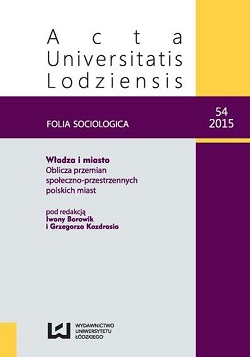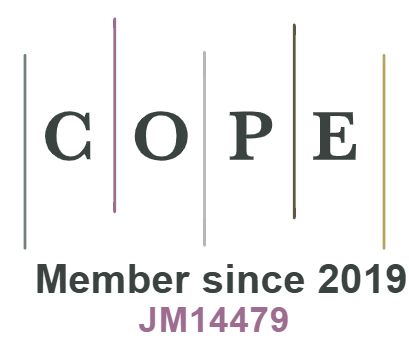Pamięć zbiorowa mieszkańców miasta. Studium o badaniach pamięci zbiorowej
DOI:
https://doi.org/10.18778/0208-600X.54.03Słowa kluczowe:
pamięć zbiorowa, pamięć zbiorowości, pamięć zbiorowa miasta, przestrzeń miejska, badania pamięci zbiorowejAbstrakt
Badania pamięci zbiorowej są wielodyscyplinarne, w badaniach społecznych pamięci dominuje podejście jakościowe. Inną cechą tego nurtu badań jest przewaga refleksji teoretycznej nad metodologiczną. Artykuł jest próbą wypełnienia tej luki − analizuje możliwości i ograniczenia badań pamięci zbiorowej i specyfikę badania pamięci zbiorowej mieszkańców miasta. Dyskutowane są wybrane przykłady (z badań własnych) ilustrujące takie kwestie, jak: funkcje pomiaru ilościowego w badaniu pamięci zbiorowej, zastosowanie fotografii w analizie odbioru przestrzeni miejskiej, badanie zbiorowej recepcji przeszłości miasta i wykorzystanie eksperymentu naturalnego do badań.
Bibliografia
Almond G., Verba S. (1963), The Civic Culture: Political Attitudes and Democracy in Five Nations, Boston.
Google Scholar
DOI: https://doi.org/10.1515/9781400874569
Connerton P. (1989), How Societies Remember (Themes in the Social Sciences), Cambridge University Press.
Google Scholar
DOI: https://doi.org/10.1017/CBO9780511628061
Corning A., Schuman H. (2015), Generations and Collective Memory, Oxford University Press.
Google Scholar
DOI: https://doi.org/10.7208/chicago/9780226282831.001.0001
Czajkowski P., Pabjan B. (2013), Pamięć zbiorowa mieszkańców Wrocławia a stosunek do niemieckiego dziedzictwa miasta, [w:] J. Juchnowski, R. Wiszniowski (red.), Współczesna teoria i praktyka badań społecznych i humanistycznych, t. 1, Wydawnictwo Adam Marszałek, Toruń, s. 739−761.
Google Scholar
Durkheim E. (2010), Elementarne formy życia religijnego. System totemiczny w Australii, Wydawnictwo Naukowe PWN, Warszawa.
Google Scholar
Erll A., Nunning A. (2004), Medien des Kollektiven Gedachtnisses: Historizitat, Konstruktivitat, Kulturspezifitat, Walter de Gruyter.
Google Scholar
Erll A., Rigney A. (2009), Mediation, Remediation, and the Dynamics of Cultural Memory, Walter de Gruyter.
Google Scholar
DOI: https://doi.org/10.1515/9783110217384
Fleck L. (1986), Powstanie i rozwój faktu naukowego. Wprowadzenie do nauki o stylu myślowym i kolektywie myślowym, Wydawnictwo Lubelskie.
Google Scholar
Fokasz Nikosz, Kopper Ákos, The Media and Collective Memory Places and Milieus of Remembering, http://www.lse.ac.uk/media@lse/events/MeCCSA/.
Google Scholar
Franas A. (2013), Gender po wrocławsku, czyli jak trudno nam się pogodzić, że Breslau nie istnieje od prawie 70 lat, „Gazeta Wrocławska”, 06.12.
Google Scholar
Gedi N., Elam Y. (1996), Collective Memory − What Is It?, “History and Memory”, Vol. 8, No. 1 (Spring−Summer), s. 30−50.
Google Scholar
Griffin L. J. (2004), “Generations and Collective Memory” Revisited: Race, Region, and Memory of Civil Rights, “American Sociological Review”, Vol. 69, No. 4, s. 544−557.
Google Scholar
DOI: https://doi.org/10.1177/000312240406900404
Halbwachs M. (2008), Społeczne ramy pamięci, PWN, Warszawa.
Google Scholar
Hirst W., Manier D. (2008), Towards a Psychology of Collective Memory, “Memory”, Vol. 16, s. 183−200.
Google Scholar
DOI: https://doi.org/10.1080/09658210701811912
Kansteiner W. (2002), Finding Meaning in Memory: A Methodological Critique of Collective Memory Studies, “History and Theory”, Vol. 41, s. 179−197.
Google Scholar
DOI: https://doi.org/10.1111/0018-2656.00198
Keightley E., Pickering M. (2015), Photography, Music and Memory. Pieces of the Past in Everyday Life, Palgrave Macmillan.
Google Scholar
DOI: https://doi.org/10.1057/9781137441218
Larson J. A., Lizardo O. (w druku), Generations, Identities, and the Collective Memory of Che Guevara, http://www.u.arizona.edu/~jlarson/Papers/Guevara.pdf/.
Google Scholar
Lewicka M. (2008), Place attachment, place identity, and place memory: Restoring the forgotte city past, “Journal of Environmental Psychology“, Vol. 28, s. 209–231.
Google Scholar
DOI: https://doi.org/10.1016/j.jenvp.2008.02.001
Maciejewska B. (2012), Bender zbudował wielki Wrocław. Nie chcą go upamiętnić, „Gazeta Wyborcza”, 08.05.
Google Scholar
Mannheim (1952), Essays in the Sociology of Knowledge, Routledge, London.
Google Scholar
Marks K. (2012), Osiemnasty brumaire’a Ludwika Bonaparte, http://maopd.wordpress.com/.
Google Scholar
Meyers O., Neiger M., Zandberg E., Hoskins A., Sutton J. (eds). (2011), On Media Memory. Collective Memory in a New Media Age, Palgrave Macmillan, New York.
Google Scholar
DOI: https://doi.org/10.1057/9780230307070
Middleton D., Edwards D. (eds.) (1990), Collective Remembering, Sage, London.
Google Scholar
Nora P. (1989), Between Memory and History: Les Lieux de Mémoire, „Representations”, No. 26, Special Issue: Memory and Counter-Memory, s. 7−24.
Google Scholar
DOI: https://doi.org/10.2307/2928520
Olick J. (2007), Collective Memory and Non-public Opinion: A Historical Note on a Methodological Controversy About a Political Problem, “Interaction”, Vol. 30, Issue 1, s. 41–55.
Google Scholar
DOI: https://doi.org/10.1525/si.2007.30.1.41
Olick J. K. (1999), Collective Memory: The Two Cultures, “Sociological Theory”, Vol. 17, s. 333−348.
Google Scholar
DOI: https://doi.org/10.1111/0735-2751.00083
Olick J., Vinitzky-Seroussi V., Levy D. (2011), The Collective Memory Reader, Oxford University Press, Oxford.
Google Scholar
Pickering M., Keightley E. (eds.) (2013), Reserach Methods for Memory Studies, Edinburgh University Press.
Google Scholar
DOI: https://doi.org/10.1515/9780748683475
Radston S. (2000), Memory and Methodology, Berg, New York.
Google Scholar
Rossington M., Whitehead A. (2007), Theories of Memory, Indiana University Press.
Google Scholar
DOI: https://doi.org/10.1515/9781474472197
Schuman H., Belli R. F., Bischoping K. (1997), The Generational Basis of Historical Knowledge, [w:] Pennebaker J. W., Paez D., Rime B. (eds.), Collective Memory of Political Events: Social Psychological Perspectives, Erlbaum Associated.
Google Scholar
Schuman H., Rieger Ch. (1992), Historical Analogies, Generational Effects and Attitudes Toward War, “American Sociological Review”, No. 57, s. 315−326.
Google Scholar
DOI: https://doi.org/10.2307/2096238
Schuman H., Scott J. (1989), Generations and Collective Memories, “American Sociological Review”, Vol. 54, No. 3, s. 359−381.
Google Scholar
DOI: https://doi.org/10.2307/2095611
Schwartz B. (1982), The Social Context of Commemoration: A Study in Collective Memory, “Social Forces”, Vol. 61, No. 2.
Google Scholar
DOI: https://doi.org/10.2307/2578232
Schwartz B. (1991), Iconography and Collective Memory: Lincoln’s Image in the American Mind, “The Sociological Quarterly”, Vol. 32, No. 3, s. 301−319.
Google Scholar
DOI: https://doi.org/10.1111/j.1533-8525.1991.tb00161.x
Szacka B. (2006), Czas przeszły, pamięć, mit, Wydawnictwo Naukowe Scholar, Warszawa.
Google Scholar
Wertsch J. V., Roediger H. L. (2008), Collective memory: Conceptual foundations and theoretical approaches, “Memory”, Vol. 16, No. 3, s. 318−326.
Google Scholar
DOI: https://doi.org/10.1080/09658210701801434
Zerubavel Y. (1997), Recovered Roots: Collective Memory and the Making of Israeli National Tradition, University of Chicago Press.
Google Scholar
Pobrania
Opublikowane
Jak cytować
Numer
Dział
Licencja
Prawa autorskie (c) 2015 © Copyright by Barbara Pabjan, Łódź 2015; © Copyright for this edition by Uniwersytet Łódzki, Łódź 2015

Utwór dostępny jest na licencji Creative Commons Uznanie autorstwa – Użycie niekomercyjne – Bez utworów zależnych 4.0 Międzynarodowe.










